Lesia Yurchyshyn lives and teaches by the motto: “Don’t be afraid! Just act! But assume responsibility for your actions…”.
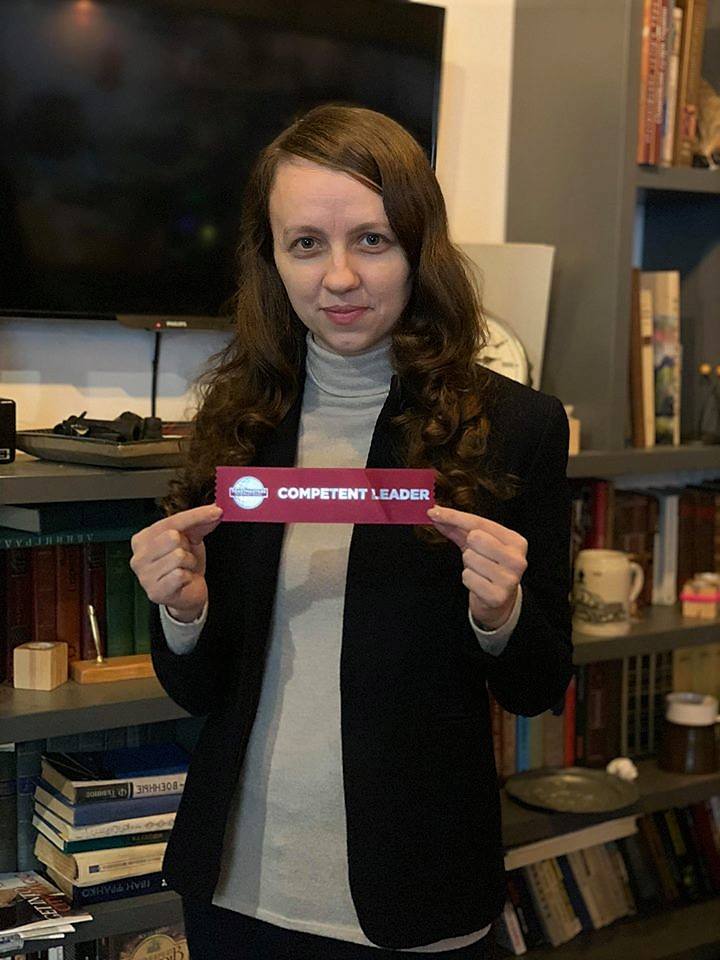
Lesia Yurchyshyn teaches history law, and civic education at the Novopecherska School in Kyiv. She is also a part-time teacher advisor at Kyiv Business Lyceum. She was one of the three finalists of the Global Teacher Prize Ukraine 2020 contest (“Civic education teacher” nomination) and a participant of the Regional Summer Academy “Democracy at School” organized by the European Wergeland Centre in Poland.
Why did you decide to become a teacher?
I have always known I would be a teacher. I don’t know how I knew it, but I was sure I would work with children. When I went to preschool and later to school, I always tried to imitate teachers. In the sixth grade I knew I would like to teach history. It was my schoolteacher who had influenced my decision because he not only told us to summarize the material but encouraged us to analyze causes and effects. My history teacher helped me to discover what I call “another eye,” i.e. a desire to plunge deeper and see more.
I added civic education and law to my teaching portfolio after I attended the Regional Summer Academy Democracy at School. I believe I benefited immensely from the participation in international projects. They enabled my professional growth and helped me gain more confidence. When you start working as a teacher, everything seems to be very difficult but later, step by step, you just do things with children.
I am so pleased with our fantastic history and civic education projects. I don’t think they would have been possible without my previous training. Universities teach very few practical skills. Additional training courses and interaction with new fascinating people give much more. You should only take it.
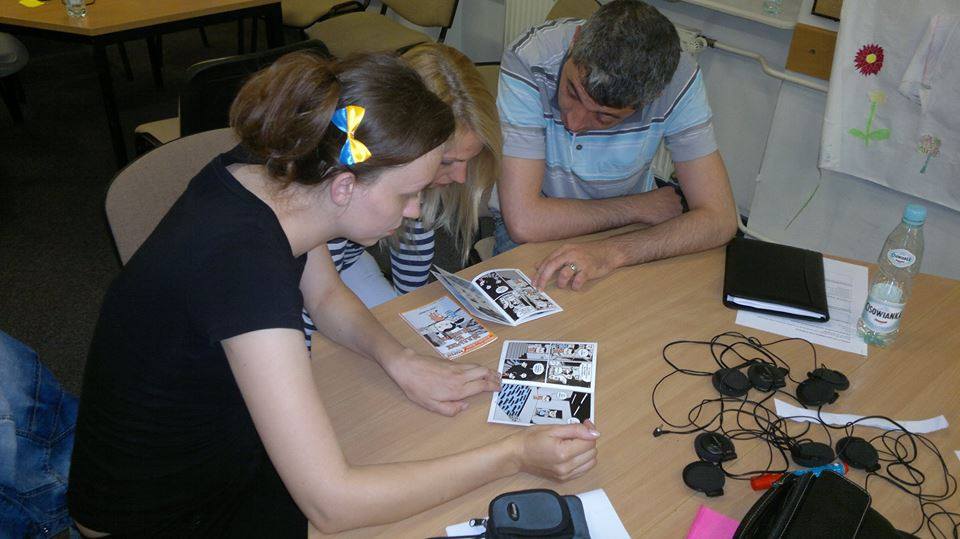
How do you interact with your students?
I believe the first meeting is extremely important. I prepare for it very thoroughly because the first impression matters. I begin the first meeting with a detailed introduction where each student presents him/herself instead of simply giving a name. I start with myself and tell them my story. Then I ask them to tell something about themselves that their peers do not know. Or, if they are shy, they can give two true facts about themselves and one false (or the other way round) and we try together to guess which facts are true.
If it is a class of students who know each other well, I suggest telling a story about a classmate. There are many icebreakers we can use. Even if the introduction activity takes 45 minutes, it is OK because it helps to create a safe atmosphere. As a result, the children will not be afraid to express their opinions and wishes. It is very valuable for me. They see you as someone who wants to do something for them and together with them and they become more communicative. Besides, you see immediately what they are interested in and you can plan your work with that specific group better.
I never give my students enormous home assignments. We always start with a conversation. It is the most essential element of the class. We have only one rule: one person speaks at a time. I also look for such forms of work that can “liven” history and help to trace cause-and-effect relationships. Active engagement in class activities is sufficient for remembering information, while knowledge and understanding of details require homework and project work.
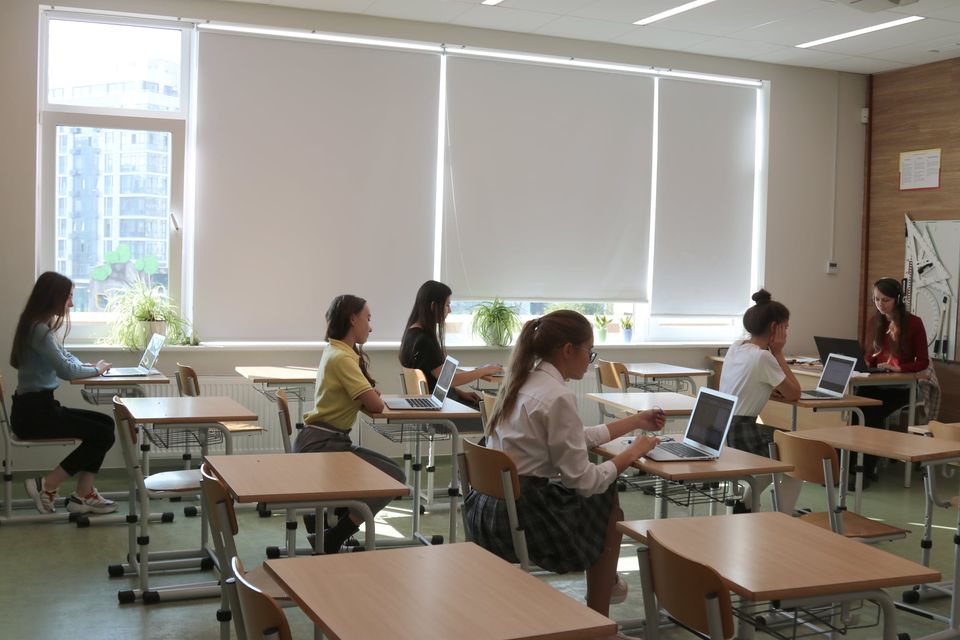
How do you hold your students’ interest in your classes?
I integrate law, civic education, and history in teaching. Although in the schedule law and civic education are separate subjects, I always take a comprehensive approach. Teaching history integrates very well with Ukrainian and world literature. The last three years I have used music a lot. For example, when I teach World War I we always listen to the song “Tam na hori, na Makivtsi” (“On the Mountain of Makivka.” The song commemorates the first major battle of the Ukrainian Sich Riflemen against the Russian Army on April 29 – May 2, 1915 that was held in the Carpathian Mountains on Makivka). We discuss the song using the emotional intelligence approach and analyze it in detail. My students keep singing the refrain of the song even after we have finished the theme. The song is rhythmic and easy to sing but also shows the essence of the historical process making it easy for teenagers to remember the event.
Such untraditional teaching methods create the atmosphere of trust and can thus increase the subject’s learning potential as students personalize the content of both history and civic education courses. In civic education classes we discuss at length the concept of identity because teenagers have problems finding their place in this world. I keep telling my students that I am only a teacher and I study together with them. It seems to help in building a positive atmosphere. In my class, we do not use anything like “You are wrong” or “Your opinion doesn’t matter.” All opinions matter and each and everyone can make a mistake, including myself. And I believe that is OK.
Do you work with projects in class?
Last year, we had a great experience with the theme of the Ukrainian revolution. The Ukrainian Institute of National Memory prepared a special map of all memory places in Kyiv. My students received an assignment to visit at least five of these places and take pictures of them. I gave them a month for it. Then they presented their five photographs in class and gave virtual tours of those places. The students learned a lot about the places, their transformation, and events that took place there. When we had a class about the heroes of Kruty (at the end of January 1918, a handful of Ukrainian students confronted superior Bolshevik forces near Kruty in a desperate attempt to block their advance on Kyiv), we also discussed different aspects of the topic and talked about facts and myths, cases of overglorification, and reality. Suddenly, my students said, “The Askold grave is in Kyiv. Let’s go there and explore the place.” I was not prepared for such a proposal and could not imagine how we would go there and what we would do on site. However, school administration did not mind the plan and we went there with the volunteers. We explored the memorial site and tried to identify the missing elements. Later, on the bus on our way back to school we had a discussion. I gave my students poems about the heroes of Kruty and we read and analyzed them. Thus, the students could experience the atmosphere of the place and the event. As a result, we had a super good lesson of memory. It would not have been possible without the students’ initiative.
What do students need to be active in public life?
I like the way the idea of being active and proactive was explained during a methodological training about Stephen Covey’s educational model Leader in Me. To be active does not imply a stereotypical expectation of being always available and ready to act. A proactive position means you are a responsible person, and this determines the way you act. You may take initiative or, as an alternative, you may help those who take initiative. Or, as an option, you decide not to act. The most important thing is to make a good and responsible choice independently. I make a decision and I can explain it.
In my opinion, responsibility starts in class. It does not necessarily mean raising your hand and answering the question. It is also a decision to do a task, or not to do it and accept the consequences. What we can certainly teach our students is readiness to make responsible choices and express opinions. Not just to shout together with others but to find the most effective and constructive solution. Making a responsible choice you act as a responsible citizen. When you cast a vote in the election you demonstrate civil activism. You do not look for excuses but express your position in a responsible way. We should start with ourselves and develop readiness to take responsibility for our actions. A passive teacher cannot bring up active students.
How do parents feel about civic education activities that allegedly distract their children from preparing for final exams?
It would be good if we had more options and could decide whether we want to focus on studying the curriculum or spend more time on activities. Much depends on parents because they decide what opportunities their children may take. Initially, some parents did not like nonstandard assignments but after we discussed them and I explained the aim of these activities they changed their opinion. I think this is the way to resolve communicative misunderstandings. If family values coincide with school values, we get an ideal triangle, but a dialogue is important in each scenario. If two smart people genuinely want to understand the point of disagreement, they will succeed. If they only want to blame each other, it is not a dialogue at all. Lack of minimal interaction has a toxic impact on school-parents’ relationships.
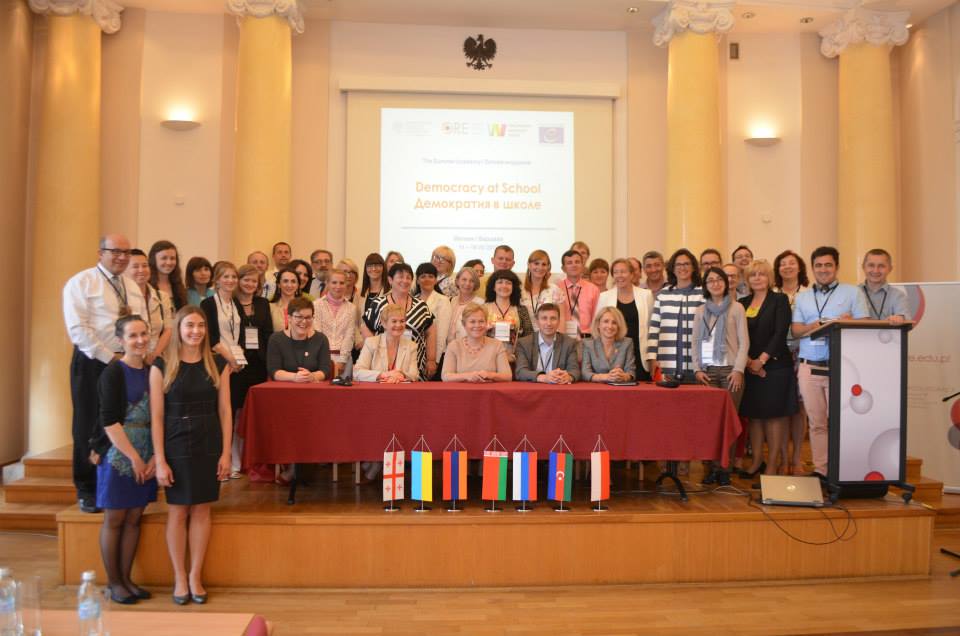
You were a participant of the 6th Regional Summer Academy “Democracy at School” organized in Poland by the European Wergeland Centre. Could you share your impressions, please?
In fact, I was a complete novice then, as inexperienced as a child. At school and at the University we had a subject “Civic Education”, but it was only theory. Then I moved to Kyiv and started working at a school there. A year later, in 2015, I went to Poland as a participant of the Summer Academy Democracy at School. For me, it was a new world: many bright people and all of them speaking about important things. Besides, it was my first study visit abroad.
The Academy was organized by the European Wergeland Centre in cooperation with the Polish Ministry of National Education and Centre for Educational Development. It was a great event with participants from Eastern Partnership countries (Armenia, Azerbaijan, Belarus, Georgia, Moldova, and Ukraine), Russia, and Poland. The program required active engagement of the participants and we had fantastic and experienced trainers. The program also included tours of Warsaw, a visit to the Museum of the History of Polish Jews, and a meeting with the Minister of Education.
We had a great intercultural party and participants of the Academy presented their countries, cultures as well as national food and drinks. We had an opportunity to talk and ask questions about places of interest. The atmosphere was fascinating. I remember very well a session about school governance (democratic and authoritarian styles of governance) and school culture. I used to believe that vertical relations are OK: the school director says what must be done and that’s it. However, it can be quite different. School rules should take into consideration rights of all stakeholders of the teaching and learning process and these rules can be changed. You may be surprised but for me, it was a real discovery. All sessions at the Academy were useful. We took home many manuals and handbooks. It was a material baggage, but it also had a symbolic meaning as it gave food for thought and we had many materials for study and reflection. I still use my notes from the Summer Academy.
What have you learnt at the Summer Academy that you still use in your work at school?
It is hard to describe which elements I use because these things are integral and comprehensive. Upon return to Kyiv, the team of Kyiv Business Lyceum was expected to share their experience with colleagues. We used our notes to prepare a workshop for the school faculty. I remember very well that my colleagues reacted in different ways to what we were presenting, to school management styles in particular. We differ in our experience and attitudes.
I have been using what I learned in the Summer Academy in teaching a lot. You should implement these ideas step by step. It will not be an exaggeration to say that the Democracy at School program was a global discovery for me. Upon our return home, the team was also supposed to prepare and implement a project. The school head Liudmyla Paraschenko decided to expand the outreach of the project and make it national. She got in touch with a German foundation that participated in the M18 Program. In Germany, they have been preparing teenagers for participation in the elections since the 1990s. We managed to launch the M18 project in Ukraine and it has been working for five years already. Let’s put it this way: when I was going to Poland, I was thinking in terms of my school only but ended up as an organizer of a national project that engaged many participants.
Are you in touch with other participants of the Summer Academy?
We exchanged contact information and we even managed to visit each other and develop and implement joint projects. Thus, the program helped people to meet each other, establish contacts, and learn new skills that both us and communities could benefit from.
In March, schools faced the challenge of distant instruction. How did you manage it?
The biggest problem was transferring online the atmosphere you have been working on for so long and so hard. I was lucky because in both schools where I taught students had personal gadgets and access to Wi-Fi. Therefore, I did not have to worry about the technical side of it. In both schools we have used remote online teaching earlier, so we had many tools available. When we had to move online it was necessary to modify and adjust some of them while it was possible to use others as they were. On the first days of the quarantine I experienced lack of information, therefore I asked advice of my colleagues and friends, talked to my students, and tested different apps. In fact, we tried a variety of tools together with my students and managed to choose the most convenient. I taught the first remote class on the first day of the quarantine.
When we are sitting in front of our screens, we miss hugs and overall atmosphere.
Uncertainty and anticipation were the other challenge. At the beginning, many of us enjoyed unexpected holidays. However, the second month made us aware that the current situation would last for a while. The third month of remote instruction brought such exhaustion and tiredness that giving home tasks made no sense. The content of the courses did not change but we had to work on their form. We used padlet boards, online team roleplay as well as webrooms for group work and communication. To put it in a nutshell, I made all I could to make my students feel involved.
When we are sitting in front of our screens, we miss hugs and overall atmosphere. The quarantine became both a challenge and a new opportunity. It seems to me we have successfully responded to the challenge and learned to appreciate interaction even more. When we lose something, we also gain something, and we keep moving forward anyway.
We always started Zoom- classes with “How are you doing?”. For some five to ten minutes we were talking, showing each other our pets, and thus creating a friendly atmosphere. Then we studied a little and ended the class with wishes of a good and joyful day and “See you soon.” These things are very important in conventional teaching and should not be neglected in online instruction either.
How did you manage to maintain your students’ motivation to study and self-study?
In my opinion, in online classes my students appreciated the atmosphere and ability to communicate. But they also did the assignments because they felt safe and at ease. Besides, they were aware they needed grades, so why not do something anyway? In remote instruction, much depends on the teachers’ attitude that must be adjusted to the situation. Teachers should understand that the crucial thing is neither the subject itself nor the curriculum developed by the Ministry. The most important thing is a value that each subject contains. The most important thing is to help your students see the value and it is imagination and technological resources that may either facilitate or block this process. The quarantine has been very exhaustive for many of us and caused stress and professional burnout. Not everyone could cope with changing regulations, technical problems, anxiety, and stress. It seems to be a reason why we have so many vacancies at schools now. It is big challenge to be a teacher these days.
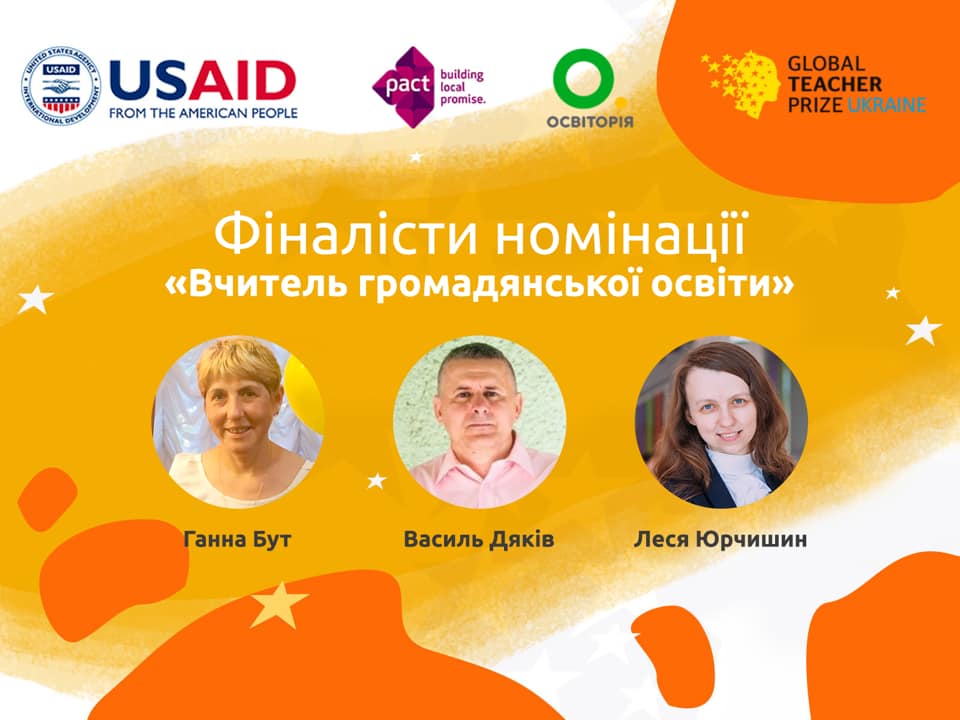
Global Teacher Prize Ukraine 2020 Contest. Why did you decide to participate and what were your expectations?
I knew about this contest for a long time, but I considered myself too inexperienced to apply. This year they added a new nomination “Teacher of Civic Education.” An old friend of mine, Iryna Ivaniuk, who also attended the Summer Academy Democracy at School and is an experienced trainer sent me a message: “Lesia, apply.” I promised to think about it but put off making a decision. A day before the deadline I received a phone call from Osvitoria (an NGO that promotes the development and reform of education in Ukraine) and they told me I was nominated by a student of mine. It made me feel responsible for the nomination. I applied right before the deadline and a day later I got ill. I realized I would not have been able to submit documents in that condition. As I was recovering, I learned I was among the TOP-50 candidates and later among the TOP-3. I could not have imagined anything like that. My competitors are great teachers and I know all of them and I am rooting for all of them.
What advice would you give to a beginning teacher?
When I was young and inexperienced I not only knew very little how to do things, but I avoided standing out. I had a deep-rooted mental habit to be quiet as a lamb. In my opinion, it is very important for a young teacher not to abandon teaching after a year or two at school. Even if you have communication problems with your students or colleagues, there are always at least a few children for whose sake it is worth preparing for the class as if you could get the Oscar for teaching it. Your peers may or may not be supportive. But you can always say to yourself, ”Well, at the moment I have very little experience. In a few years, I will learn as much as I can and will keep developing.” My first job was in a very small school in Ternopil Oblast. I was new, but my peers taught me and showed me everything they knew.
Not all methods used by senior colleagues are applicable for young teachers, but we should appreciate a chance to learn from their experience and supplement it with new technologies. With time, you begin enjoying your work. I was lucky to work in a good school although I hear a lot about toxic school atmospheres and rejection of those considered black sheep. Obviously, it is exhaustive and demotivating. But even if you find yourself in a hostile environment you may try and change at least one or two people. I am deeply convinced that even one person can do a lot in one’s place. Even one person can initiate a process of transformation. Even if your colleagues do not support you, teacher’s freedom allows for self-fulfillment and finding recognition in other ways. The rule is not be afraid, not to look around but to act. Take responsibility and begin with yourself.
How will you describe your dream school?
My ideal school is based on friendly relations with students. It is a place where you are not afraid of judgement, bad grades and punishment. Therefore, atmosphere is very important. Certainly, it is easier to create a supportive atmosphere in a small school. However, a large school offers better opportunities for interpersonal communication and has a more diverse environment required for bringing up open-minded citizens who can dream big and think globally. Besides, in a large school we can do projects at different levels: not only with school students from one class but with students from different classes and years of study. Older school students can help younger ones and they can do something together. This approach is very effective: students learn from each other, younger ones take their older peers as an example, interaction improves, and students of different age learn to understand each other better.
My ideal school is also a school of trust where all sides exchange experiences, communicate, and collaborate with each other. Collaboration is the key word. Only then technical aids, expertise, availability of a gym or swimming classes matter. They are supplementary and secondary.
What inspires and motivates you?
My students. They can always find a solution and always suggest something unique. Then you feel motivated to live and create.
Photo from Lesia Yurchyshyn’s private archive.